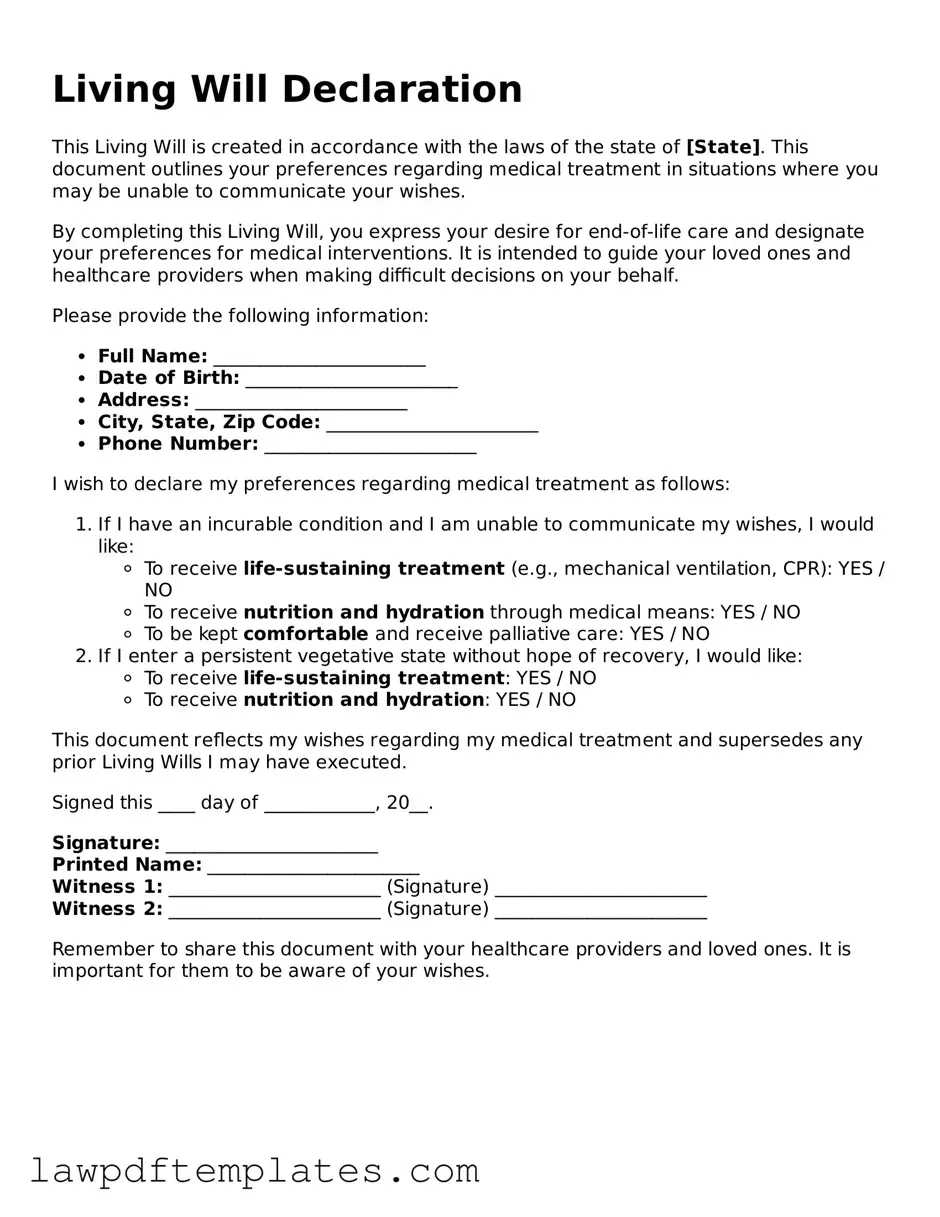Attorney-Approved Living Will Document
State-specific Living Will Forms
Form Breakdown
| Fact Name | Details |
|---|---|
| Definition | A Living Will is a legal document that outlines an individual's preferences for medical treatment in the event they become unable to communicate their wishes. |
| Governing Law | Each state has its own laws governing Living Wills. For example, in California, it is governed by the California Probate Code Section 4780-4806. |
| Purpose | The primary purpose of a Living Will is to ensure that a person's healthcare wishes are respected, particularly regarding end-of-life care. |
| Requirements | Most states require the document to be signed by the individual and witnessed by at least one other person or notarized. |
| Revocation | A Living Will can be revoked at any time by the individual, provided they are mentally competent to do so. |
| Durability | This document remains effective until it is revoked or the individual passes away, making it a durable directive. |
| Healthcare Proxy | While a Living Will outlines treatment preferences, it does not appoint someone to make decisions on behalf of the individual; that requires a separate healthcare proxy document. |
| Accessibility | Individuals should keep copies of their Living Will in accessible locations and provide copies to family members and healthcare providers. |
Sample - Living Will Form
Living Will Declaration
This Living Will is created in accordance with the laws of the state of [State]. This document outlines your preferences regarding medical treatment in situations where you may be unable to communicate your wishes.
By completing this Living Will, you express your desire for end-of-life care and designate your preferences for medical interventions. It is intended to guide your loved ones and healthcare providers when making difficult decisions on your behalf.
Please provide the following information:
- Full Name: _______________________
- Date of Birth: _______________________
- Address: _______________________
- City, State, Zip Code: _______________________
- Phone Number: _______________________
I wish to declare my preferences regarding medical treatment as follows:
- If I have an incurable condition and I am unable to communicate my wishes, I would like:
- To receive life-sustaining treatment (e.g., mechanical ventilation, CPR): YES / NO
- To receive nutrition and hydration through medical means: YES / NO
- To be kept comfortable and receive palliative care: YES / NO
- If I enter a persistent vegetative state without hope of recovery, I would like:
- To receive life-sustaining treatment: YES / NO
- To receive nutrition and hydration: YES / NO
This document reflects my wishes regarding my medical treatment and supersedes any prior Living Wills I may have executed.
Signed this ____ day of ____________, 20__.
Signature: _______________________
Printed Name: _______________________
Witness 1: _______________________ (Signature) _______________________
Witness 2: _______________________ (Signature) _______________________
Remember to share this document with your healthcare providers and loved ones. It is important for them to be aware of your wishes.
Common mistakes
Creating a Living Will is an important step in ensuring that your healthcare wishes are honored when you can no longer communicate them. However, many people make common mistakes while filling out this essential document. Understanding these pitfalls can help you navigate the process more effectively.
One frequent error is failing to specify treatment preferences clearly. It's crucial to articulate your wishes regarding life-sustaining treatments, such as resuscitation and artificial nutrition. Without clear directives, healthcare providers may struggle to interpret your intentions, potentially leading to unwanted interventions.
Another mistake is neglecting to update the Living Will as circumstances change. Life is dynamic, and so are our preferences. Whether it’s a change in health status or personal beliefs, reviewing and revising your Living Will regularly ensures that it reflects your current desires.
Some individuals overlook the importance of appointing a healthcare proxy. While a Living Will outlines your wishes, a healthcare proxy acts on your behalf. Without designating someone you trust to make decisions for you, your wishes might not be honored in critical situations.
Additionally, many people forget to discuss their Living Will with family members or their designated healthcare proxy. Open conversations can prevent confusion and conflict among loved ones during emotionally charged moments. Sharing your thoughts allows your family to support your decisions and advocate for your wishes.
Another common mistake involves not signing or dating the document appropriately. A Living Will must be signed to be valid. Moreover, dating the document is essential to demonstrate that it reflects your most current wishes. An unsigned or undated form may be deemed ineffective by healthcare providers.
Some individuals may also fail to consider state-specific requirements. Each state has different laws regarding Living Wills, including what must be included and how the document must be executed. Familiarizing yourself with these regulations can help ensure that your Living Will is legally binding.
Finally, a lack of witnesses or notary signatures can invalidate your Living Will in certain jurisdictions. Many states require that the document be witnessed by one or more individuals or notarized. Failing to meet these requirements can lead to complications when the document is needed most.
By being aware of these common mistakes, you can create a Living Will that accurately reflects your wishes and provides peace of mind for both you and your loved ones. Taking the time to fill out this document carefully can make all the difference in ensuring your healthcare preferences are respected.
Popular Templates:
Waiver Form - Can help streamline the registration process for events.
California Correction Deed - Using a Corrective Deed helps to safeguard your investment.
The Tractor Bill of Sale serves as a vital document that facilitates the legal transfer of ownership for tractors in Georgia. To ensure that you have all necessary information, refer to this helpful resource: important Tractor Bill of Sale form guidelines.
Creating a Job Application - This form is for applying for a job with our company.
